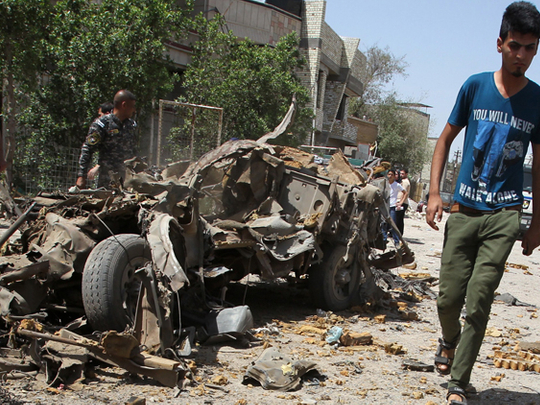
Baghdad: A wave of car bombings hit several, mostly Shiite neighbourhoods of Baghdad on Wednesday morning, killing at least 16 people and wounding dozens, officials said, the latest bout of violence as Iraq prepares to hold the country’s first parliament elections since the 2011 US troop withdrawal.
The explosions, all from parked explosives-laden vehicles, coincided with the anniversary of the 2003 fall of Baghdad in the hands of US troops.
The bombings bore the hallmarks of an Al Qaida-inspired group and other Sunni insurgents, who frequently use car bombs and suicide attacks to target public areas and government buildings in their bid to undermine confidence in the Shiite-led government.
No group immediately claimed responsibility for the bombings.
The deadliest of the day’s attacks took place in Baghdad’s central Nidhal Street, where four civilians were killed and 11 were wounded, police officials said.
In the northern Kazimiyah district, three people died and nine were wounded in another car bombing. Car bombs also exploded in the areas of Shaab, Shammaiya, Karrada and Maamil, killing a total of seven people and wounding 30, police officials added.
Medical officials confirmed the causality figures.
All officials spoke on condition of anonymity because they were not authorised to talk to the media. Violence has surged in Iraq since last year, with the country weathering its deadliest bout of violence since it pulled back from the brink of civil war in 2008.
UN figures showed that last year, Iraq saw the highest death toll in attacks, with 8,868 people killed.
More than 9,000 candidates will vie in the April 30 elections for 328 seats in the parliament.
On Tuesday, the country’s Independent High Electoral Commission announced that balloting would not be held in parts of the Sunni-dominated Anbar province engulfed in clashes between security forces and Al Qaida-inspired militants.
Since late December, the western Anbar province has seen fierce fighting between government troops and allied tribal militias on one side, and militants from the Islamic State of Iraq and the Levant, an Al Qaida spin-off group, on the other. The militants have seized and are continuing to hold parts of the provincial capital, Ramadi, and nearly all of the nearby city of Fallujah.












